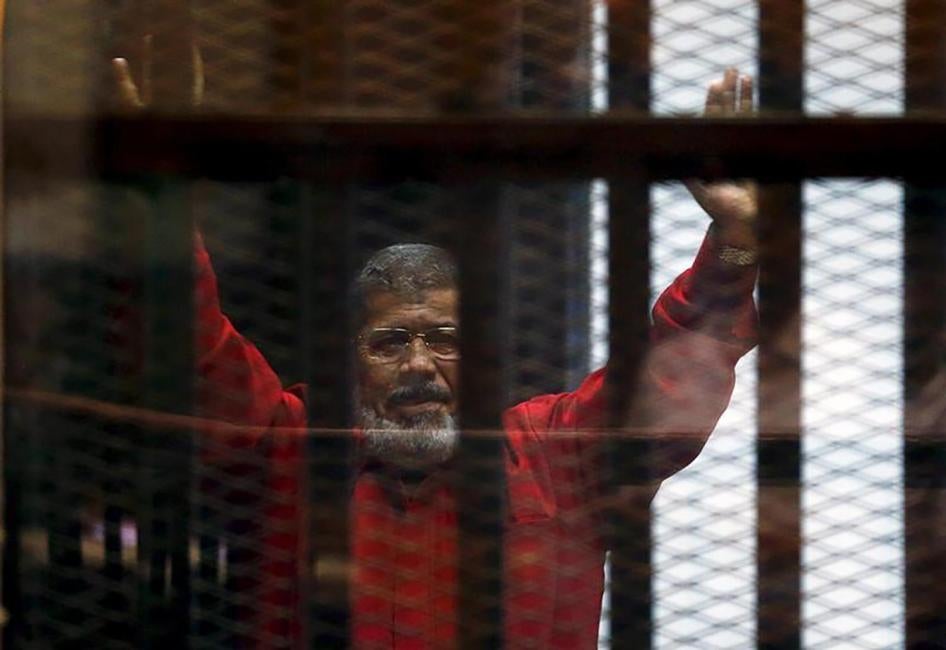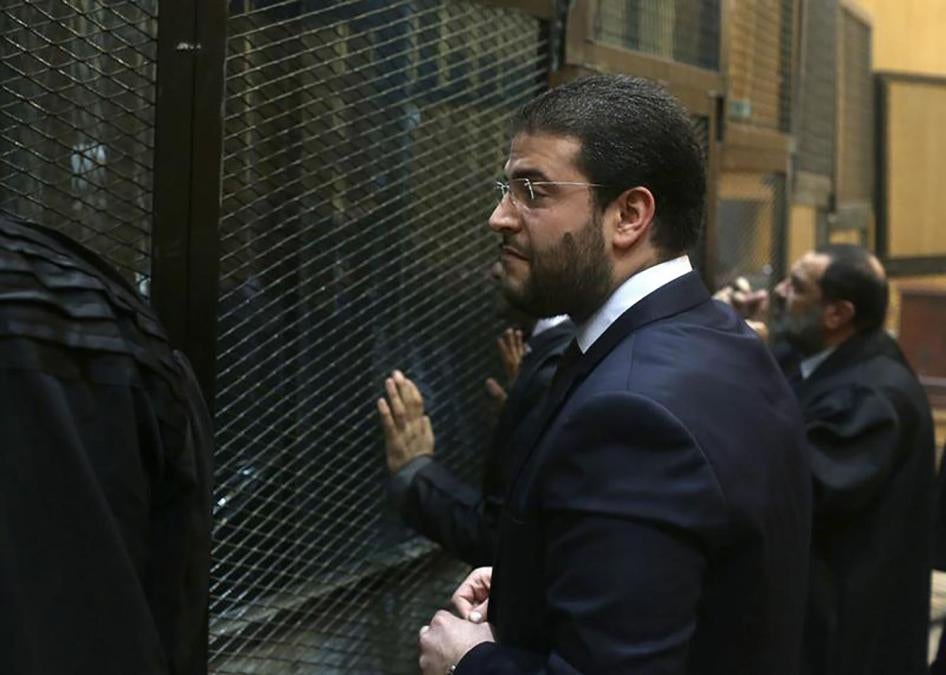(Beirut) – Egyptian authorities have unlawfully prevented former President Mohamed Morsy from contacting or receiving visits from his family and lawyers in the years since the military forcibly removed him from power in July 2013, Human Rights Watch said today. On June 4, 2017, Egyptian authorities allowed Morsy to receive visits from his family and lawyer for only the second time in nearly four years.
These conditions undermine Morsy’s right to mount a legal challenge to his detention and a defense against the many prosecutions filed against him and may have contributed to a decline in his health. During the first week of June, Morsy fainted twice and experienced a diabetic coma, his family told Human Rights Watch.
“Egyptian authorities appear to have seriously violated former President Morsy’s due process rights and may be interfering in his proper medical treatment,” said Joe Stork, deputy Middle East and North Africa director at Human Rights Watch. “Morsy’s treatment is a window into the appalling conditions suffered by thousands of political detainees in Egypt.”
During a court hearing on June 12, Morsy told the presiding judge that he would like to meet with his defense team to brief them on what he has been “exposed to” in prison and how it has affected his life, according to an account of the hearing published in the newspaper al-Shorouk. Morsy characterized his treatment as “crimes” that have had a “direct effect” on his life, including fainting on June 5 and 6, the newspaper reported. The court also read an official medical report from prison doctors, which stated that Morsy’s health is good but that he has diabetes.
A family member told Human Rights Watch that the authorities had allowed Morsy’s wife and daughter to see him for 30 minutes on June 4, but barred his four sons and other relatives from visiting. Morsy’s only previous visit with his family was in November 2013. On June 4, authorities also allowed Abd al-Moniem Abd al-Maqsoud, a member of Morsy’s legal defense team, to meet with Morsy for 10 minutes, the first time Morsy had received visit from a lawyer since January 2015.
Both meetings were in al-Molhaq Prison, part of the Tora Prisons Area in Cairo. There was no glass barrier separating Morsy from his family, as is usually the case in such visits, but a member of a security agency, whom the family member declined to name, was present.
The relative said that Morsy told his lawyer that he wanted to meet with his entire defense team to discuss “serious issues concerning his life” and that he would only raise these issues in public before a judge, the family member said.
On June 8, Morsy’s defense team filed a complaint to the prosecutor general saying that Morsy’s life could be in danger and asking to transfer him to a private health facility for examination. They also asked to meet with him again.
The relative said that, in the June 4 visit, Morsy appeared to be in “good but not excellent” health but that the former president, now 68, had lost considerable weight. Three days later, during a scheduled hearing in the retrial of a case in which Morsy is accused of participating in mass prison breaks during the 2011 uprising, the court refused to allow Morsy to speak. His relative said the family received information about his fainting and diabetic coma from other prisoners who were held near Morsy in the courtroom that day. Morsy told them he feared for his life and had started abstaining from eating anything but canned food, the family member said.
In August 2015, on one of the few occasions Morsy was allowed to speak before a court, he raised similar health concerns and asked to be examined by a private health facility, given his age, detention, and diabetes, but the government has never allowed it. During that same hearing, Morsy said he had on multiple occasions refused prison food that if eaten “would have led to a crime.”
His relative told Human Rights Watch that a prison nurse or doctor usually checks Morsy’s blood pressure and sugar level every few days but provides no other health care. The relative added that the authorities have never allowed the family to deliver any food or medicine – as most relatives of prisoners can do to supplement the often dangerously meager provisions in Egyptian prisons – and that Morsy had been buying his own insulin using money deposited by his family. The authorities have also denied Morsy any access to newspapers, television, and phone calls, the relative said.
After the military, under then-Defense Minister Abdel Fattah al-Sisi, arrested Morsy and deposed his government on July 3, 2013, it held him incommunicado without charge or judicial process for 23 days. Officially, his imprisonment began on July 26, 2013, when the authorities announced an investigation against him, but they did not transfer Morsy to a legal detention site – Borg al-Arab Prison in Alexandria – until November 4, 2013, for his first court appearance.
On July 22, 2013, after the authorities had begun using deadly force to disperse mass sit-ins opposing Morsy’s removal, the European Union called on the interim government led by then-President Adly Mansour to release Morsy to help de-escalate the situation. The government did not release him. On July 30, Catherine Ashton, then the EU foreign policy chief, was able to meet with Morsy in detention. An African Union delegation met with Morsy for one hour the following day. The authorities allowed Morsy one phone call, in October 2013, and allowed his family to visit once after moving him to Borg al-Arab Prison.
In December 2016, authorities arrested Morsy’s son Osama, who faces charges alongside hundreds of other defendants in the main trial stemming from the government’s deadly August 14, 2013, dispersal of a mass sit-in in Cairo’s Rab’a al-Adawiya Square opposing Morsy’s removal. Osama and the other defendants, many of whom were protesting at Rab’a square, are accused of blocking roads, belonging to a banned group and attempted murder. The authorities moved Osama to “Scorpion” Maximum Security Prison, also in the Tora complex, and have not allowed the family or lawyers to visit him.
Since his ouster, Morsy has faced five separate trials on charges that include conspiring with Hamas and Hezbollah, committing espionage by leaking state secrets to Qatar, insulting the judiciary, and orchestrating the deadly dispersal of opposition protesters outside his presidential palace in 2012.
Previous Human Rights Watch reviews of the presidential palace clashes, prison breaks, and conspiracy trials found that all were compromised by serious due process violations and appeared politically motivated. The prosecution case file summary in the prison breaks and conspiracy cases, which were tried together, showed no evidence that prosecutors sought to establish individual criminal liability. In the presidential palace clashes case, prosecutors rested their theory of Morsy’s responsibility for the deaths of protesters solely on the basis of his relationship with the Muslim Brotherhood.
In June 2015, a court sentenced Morsy to death in the prison breaks case and to life in prison in the conspiracy case. In June 2016, a separate court sentenced Morsy to life in prison in the espionage case. All of these verdicts have been overturned on appeal, and the cases are being retried. His 20-year sentence in the presidential palace clashes case was upheld on appeal, and he remains on trial in the case involving alleged insults to the judiciary.
Prisoners have the right to the highest attainable standard of physical and mental health guaranteed in the International Covenant on Economic, Social and Cultural Rights, which Egypt ratified in 1982. The United Nations Human Rights Committee has affirmed that the International Covenant on Civil and Political Rights, also ratified by Egypt in 1982, requires governments to provide “adequate medical care during detention.”
The Committee Against Torture, the monitoring body of the Convention against Torture and Other Cruel, Inhuman or Degrading Treatment or Punishment – ratified by Egypt in 1986 – has found that failure to provide adequate medical care can violate the treaty’s prohibition of cruel, inhuman, or degrading treatment.
In 2016, Human Rights Watch found that the authorities’ treatment of prisoners held in Scorpion Prison, where many prominent opposition and Muslim Brotherhood political figures have been held since 2013, violated a host of protections afforded to detainees.
“Egypt should stop this cruel retaliation against Morsy and his family,” Stork said. “As with all detainees, Morsy’s rights should be fully respected and guaranteed.”









